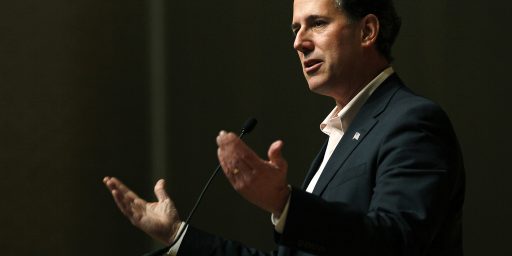Contraception Politics: More Numbers
As a follow-up to my previous post on this subject, here are some more numbers.
First, PPP:
-56% of voters generally support the birth control benefit, while 37% are opposed. Independents strongly favor it, 55/36, and a lot more Republicans (36%) support it than Democrats (20%) oppose it. Women are for it by a 63/29 margin.
-Only 39% of voters support an exemption for Catholic hospitals and universities from providing the benefit, while 57% are opposed to one.
-There is a major disconnect between the leadership of the Catholic Church and rank and file Catholic voters on this issue. We did an over sample of almost 400 Catholics and found that they support the benefit overall, 53-44, and oppose an exception for Catholic hospitals and universities, 53-45. The Bishops really are not speaking for Catholics as a whole on this issue.
Second, Fox News:
The new Obama health care law requires that employer health plans provide birth control coverage as part of preventive services for women. Catholic and other religious-affiliated hospitals and universities typically have not provided any birth control coverage for their employees, and oppose the new requirement because it violates their religious rights. Overall, do you approve or disapprove of requiring employer health plans to cover birth control for women?
Approve 61%
Disapprove 34
(Don’t know) 5
Note: the above question was before the compromise that was offered. Granted, it was also, therefore, before a lot of the media attention.
Still, I continue to see this issue as a political problem for the GOP and a winner for the Democrats. As such, the fact that the GOP keeps elevating it in the discourse (e.g., the Issa hearings) is a baffling from a strategic point of view.






Nobody seems to be concerned about the fact that paying for day to day needs is not INSURANCE. Do you expect your car insurance company to pay for oil changes? They will just have raise premiums the amount it costs them to cover that item. You are giving the insurace company money just to have them give it back to you.
Insurance is when you pool resources to cover things that happen infrequently to any one individual but happen with regularity among the people contributing to the pool of money. You can’t buy insurance to cover your grocery bill. This whole debate is based on a false premise, namely that it makes any sense at all to cover this rather than focus on expensive risks insurance is meant to cover, like major surgeries or other big ticket care.
@RandomJerk: It’s a constant source of amazement to me that there are so many people on the right who think they’re making some profound statement in saying that health insurance doesn’t work the same way as auto insurance, and therefore it isn’t really insurance and therefore it should be eliminated or completely remade into something more like auto insurance. This may come as a shock, but I don’t think the American people will be willing to give up coverage just because you like to play semantic games.
@RandomJerk:
Well, first, I think you are right about one thing: the political fight that the GOP can possibly win is the funding question. However, instead of focusing on that issue, we seem to have had a doubling-down on contraception.
Second, I will say this: I am not even sure that “insurance” (especially as you describe it) is necessarily the right term (we are, to be honest, talking about health care itself).
Third, beyond that, however, even if we are talking insurance, contraception is cheaper than giving birth, so even if we are going to talk about this in terms of cost, preventing pregnancy is cheaper (by far) than not doing so.
@WR:
Unfortunately our resident house jerk doesn’t comprehend that insurance is a generic term that covers a host of different types of protection against potential loss or recurring costs or the provision of income in certain circumstances.
@RandomJerk:
Striking about your comment is that it fails to address the purported casus belli: Religious freedom (or threatened lack thereof).
Even if Obama haters have to come up with half-baked arguments on the fly, when he’s for it then they’re against it.
This is actually a lie. The EEOC ruled in 2001 that any employer providing a prescription drug plan must provide coverage for contraception to comply with Title VII of the Civil Rights Act of 1964. This was upheld by a federal district court in Erickson v. Bartell Drug Co. (which the Supreme Court refused to consider on appeal).
There has already been a contraception mandate for 12 years now.
All that the Obama rule changes is that the plans cannot charge a co-pay or doctor’s fee for it. And while I would argue that this sort of mandate is a bad idea in general, the idea that contraception specifically is either new or the result of some sort of anti-Catholic bias is the sort of phony tempest in a teapot outrage that makes up so much of the Republican criticism of Obama lately.
@RandomJerk:
Because it’s not relevant to the discussion.
If framed in the context of economics rather than semantics, the impact on health care costs of a system of a high-risk insurance supplemented by out of pocket payment for day to day expenses might be an interesting thing to contemplate.
Crying “Nuh-uh!” doesn’t really contribute anything.
Also, as Robot Boy mentioned, this is about religious exemptions, not cost cutting, so isn’t the place to have either conversation.
@RandomJerk:
I would note that it’s increasingly common for car warranties (which is ultimately a form of insurance) to include free oil changes because the insurers that are ultimately backing the warranties have noticed that regular oil changes reduce the total costs over the life of the warranty.
@Stormy Dragon:
To expand on that point: if you don’t get regular oil changes, your car is at increased risk of mechnical failures. So of course “auto insurance” doesn’t cover them. That policy doesn’t cover breakdowns. There are, in essence, three kinds of auto insurance out there today:
1. Collision insurance, which insurers against the liability resulting from damage to property or personal injury during a collision that the policy holder was responsible for.
2. Comprehensive coverage, which covers damage to a vehicle cause by natural events, non-negligent actions by the policy holder, or non-liable third parties. Note that while this is often bought along with collision coverage, there’s no legal requirment to have this.
3. Warranties/service plans, which cover mechanical failure that occurs in due course of operating the vehicle
The conservative argument tends to assume health care is most like #1, when it’s actually more like #3.
Perhaps, then, we should acknowledge that so-called health insurance plans are really health maintenance plans.
Note the 62/29 split for women in that first poll. Those are huge numbers, and as I stated in the previous thread, a lot of women take this issue very personally. It’s hard to see how “elevating” the issue will do anything other than hurt the GOP among women voters.
Dr. Taylor, I was at Mass when our new priest was reciting the bishop-driven spiel about this issue. The number of blatant “Whatever!” looks among middle-age and older members was staggering. The younger, college-age ones are much more zealous (at least in this area), but from what I’ve seen, their parents are not biting. But even the more zealous ones that I know are still on birth control, they just look for loopholes in church doctrine to justify it such as “I’m using it for acne” (I’m not making that up). The general population is quietly zoning out this campaign. I’ve even spoken to NUNS that say “I know this is church policy, but…” At least at my parish, there is a general consensus that no one wants to hear about political issues at church. No one says anything outright because of the “eventually they will get tired and drop it” belief among members…not to mention that the zealots are horror-movie scary.
Personally, I am of the belief that this is a marketing smoke screen to associate the Catholic Church with something other than the priest scandal.
I see the comparison of Health and Auto insurance made frequently — the key differance it that auto insurance does not cover “wear and tear” of your car.
If auto parts wear out or breakdown from routine usage your auto policy ain’t paying for it.
As for Health insurance, well, when my knee started hurting from the running I was doing (routine wear and tear) my health insurance did in fact cover treatment.
It really is an obvious and huge difference…
@Sheri:
Women walked out in my wife’s church while a younger priest was giving the spiel. IMHO the church needs to be very careful about embroiling themselves in a Republican led political campaign over contraception access when allegedly 98% of catholic women use it. This could have pecuniary consequences.
@sam:
This anything to do with HMO’s?
As you point out it’s a semantic smokescreen. Insurance is a generic term to cover protection against any sort of potential loss or cost the terms of which are spelt in the agreement.
There are some on the left side of the internet (where I spend my time when I’m not in Rino-leaning places like this one, for which Thank You Very Much) who fear that the so-called-conservatives will use the ‘religious freedom’ argument to make great fields of hay from this argument. I think the clever Ms Sheri above proved this is not the case. We all love freedom in the abstract. But “freedom” means one is “free” to do some particular thing. And in this case, that “thing” is very very unpopular.
I think this is a Terry Schiavo moment. And note that Mr Santorum is the prettiest cheerleader on the losing team of both contests.
Well if that is the case, it is doomed to fail, as this desire to highlight what the Church thinks that women should do in their personal lives only magnifies how rotten the Church has been in protecting innocent children…does anyone recall bishop-driven lectures given by priests about the evils of child molestation…
Obviously certain idiots in the GOP didn’t learn from that debacle and need to be slapped down yet again…
@An Interested Party:
Yes, I do remember the anti-molestation homilies in my diocese. I vividly recall the background check and child training I had to receive in order to work with children. I remember the tests I had to take every term regarding child protection. I remember being told repeatedly and having to sign documentation that I was aware that I could be held criminally accountable for not reporting a molestation. I never thought much of letting a child hug me until I agreed to teach at my parish and went though the training.
Every diocese has its own set of laws. There are the overall global church laws, but dioceses are allowed to make rules the same way states in this country are. Last I checked, the procedure for handling priests that commit crimes against children in my diocese is a “guilty until proven innocent…but you still can’t minister at a church once accused” policy. No one in their right mind thinks the crisis in the church was handled the way it should. However, I suspect that your commentary has precious little to do with concern for child welfare and is more of the “your entire church and everyone in it is evil” sentiment that I deal with on a regular basis.
Did all of this happen before or after the molestation scandals received significant media attention?
Your suspicion is incorrect…the Catholic Church is responsible for many good things, and individual Catholics should not be held responsible for the actions of a minority of priests and those in the Church hierarchy who covered up their crimes…at the same time, innocent children being molested is far more important than why women have sex and what they do to prevent themselves from getting pregnant…this is of the same piece as that old line that some care more about people before they are born rather than while they are actually alive…
@An Interested Party: I’ve only been Catholic for six years, so naturally I wouldn’t know what was at a Mass before hand because it predates my joining the church. However, I have been a member of several different denominations and even non-Christian faiths over many years in several states before becoming Catholic. My current church/diocese is the only one that required fingerprints on file to teach Sunday school. But what matters to me is that the crisis is being condemned, publicly and privately. I will end this discussion with you with that.
@JohnMcC:
I think you are right, this is a Terry Shiavo moment. But from the stats and what I’ve witnessed with my own eyes and ears, no one–including some nuns and (mostly older) priests (Yes, I’ve actually spoken with a priest that said “I don’t care…that’s the wife and husband’s job to sort that out.”)–are jumping on this bandwagon.
*is*
@Sheri: Ms Sheri, your obvious sincerety shines through and may your new spiritual home fill you with peace and inner richness. It is a constant source of nagging sadness for me that I am denied a faith like the one I grew up in. I envy you that, ma’am.